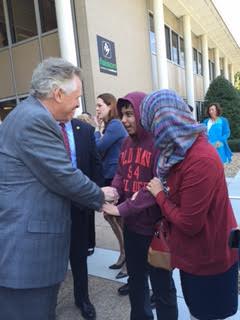
Ali Family Autism Truths #11 – April 11, 2016
As we wrapped up our monthly meeting, we pulled out our calendars to schedule our meeting for the next month.
How about May 12? She asked me.
No, I said. That’s my birthday. I don’t want to be depressed on my birthday.
She laughed. Depressed?
No, I’m serious, I said. Just consider this for a minute. We’re inclined, as humans, to try and live positively. No matter what is hard or difficult for us or our children, I try to live with the belief that “I got this. I can handle this.” But once a month we meet and the point of these meetings is for me to lay out every single thing that is difficult. Every single thing that is so, so hard for D, and for the rest of us. The point of these meetings is for me to tell you why “I don’t have this.” And why “We are all having trouble handling this.” And that’s really hard to do. Every time we meet and I have to be really honest with you, the whole day is hard.
She looked at me, fully understanding in that moment what I meant.
Ok, forget May 12. How about May 9?
I had my monthly meeting today with D’s ID (intellectual disability) waiver case manager. We meet monthly to assess what is going on with D, all the difficulties and challenges he has gone through in the past month, and everything that we are struggling with. I broke down what waivers are in a previous post. So briefly:
[D] is on the wait list for this waiver, which would help get him more care giving support and a host of other things to help facilitate his living in his own home with his family.
D’s been on the wait list for several years, in an “urgent” position due to some of the major challenges he has. Others have languished on the wait list for much longer. It’s a complicated system for someone to get a waiver, with the waiting list being in the thousands. (Nearly 10,000 on the wait list for intellectual disability or developmental disability waivers in the state of Virginia, and only a handful of slots open up every year.)
So how does one get off the waiting list and get a waiver? The caseworkers and state employees who assess these things look at several things: the severity of the disability, the situation of the family (single parent? health of parent(s)? age of parent(s)?), the home environment, how important is the waiver to helping one live in the community versus being thrown in a group home or a hospital, as well as a bunch of other things.
One of the biggest rallying cries of autistics as well as their families and friends is that we need adequate supports in place to help those with autism live as independently and fully as possible. Especially as they age and get close to aging out of the school system, the question becomes – what next?
Medicaid waivers are one of the ways autistics and their families can apply for the support that will help them stay out of group homes and live with their families or in an independent (and supported) situation. But boy is it hard to get a waiver. Some are easier to obtain. But others, like the ID or DD (developmental disability) waiver, which offer a greater number of supports, are much harder with waiting lists that number in the thousands, depending on which state you live in.
And how about if your loved one gets into a crisis situation? In the state of Virginia, where we live, three years ago State Sen. Creigh Deeds was stabbed multiple times in the head and chest by his son Gus in an altercation. Gus, a 24-year-old who suffered from bi-polar disorder, took his own life with a rifle. This followed after Sen. Deeds had reached out to his local community service board, seeking an Emergency Custody Order to find his son a hospital bed.
When a bed wasn’t found in the legal six-hour time frame, Gus was released. Later he was dead. If Deeds, a state senator faced this abhorrent lack of help and support for his son in a crisis situation, what chance do we have – God forbid – if D ever has a crisis situation?
The truth is that not nearly enough attention is given to what kind of federal, state and local supports are available to those with autism and their families as they age into adulthood. Things are vastly different depending on which state you live in.
We want to do right by D. Whether that’s living with us with support as he gets older or seeking an independent living situation (with support) for him – whatever that may be, we are committed to his future. I want to say, I got this. D has this covered. But the truth is, it takes a village.
So why is that village so hard to come by sometimes?
Stay in touch! Like Muslimah Next Door on Facebook:











